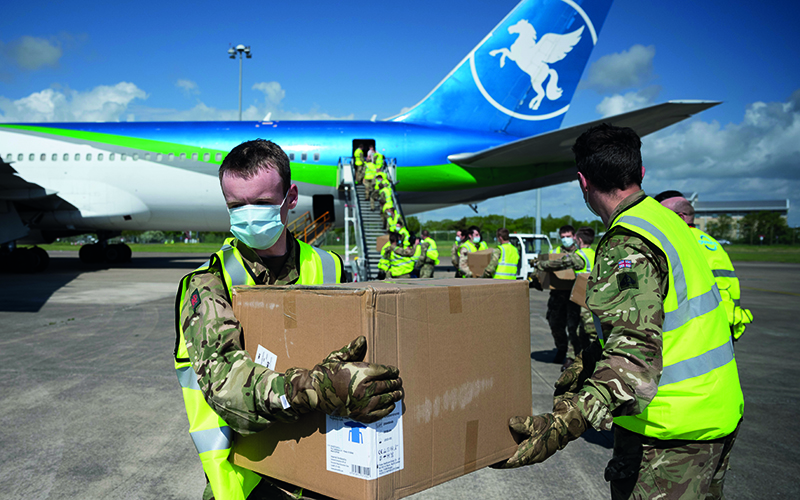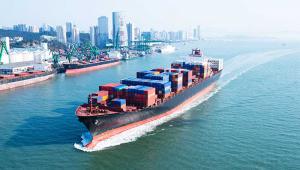The importance of effective public procurement has never been in sharper focus. When Covid-19 hit, governments rushed to purchase medical supplies and personal protective equipment to deal with the health crisis. The unseemly international scramble led to a sudden and terrible realisation. Public procurement systems were unable to fulfil their most basic purpose: providing the public sector with the goods it needs.
The entire interconnected supply system has proven fragile when just a small number of links in the chain break. The huge global demand for medical protective equipment necessitated quick decisions, fast turnarounds and the bypassing of established tendering procedures. But is the shock likely to affect public procurement in the long term? What do public bodies need to consider to avoid being caught out again?
“During that period of PPE panic-buying, most of the suppliers that governments were dealing with weren’t actually manufacturing PPE themselves,” says CIPFA’s insurance and procurement networks adviser, Mohamed Hans. “They were buying from China. And the pandemic showed us that when international embargoes were set up, we found it really difficult to get hold of items.”
This demonstrated the need for the public sector to diversify its supply chains, Hans says, to prevent the problem recurring. Whether caused by future crises or a slide towards protectionism from trade superpowers such as China and the US, trade restrictions could become more frequent in the years to come.
The public sector needs to be ready for this. Hans suggests this diversification could involve using more local suppliers or more small and medium-sized enterprises. In either case, he says it will be important to identify the primary sources of their materials. In many instances, the ultimate source might turn out to be a big producer, such as China, and the contract would still be vulnerable to global crises.
“The pandemic has shown that commercial astuteness is essential”
Annamaria La Chimia, professor of law and development at the University of Nottingham and director of the university’s Public Procurement Research Group, says overreliance on big exporters such as China and India is no longer sustainable. She suggests countries will need to look closer to home in the future to ensure the security of their supply chains.
However, such a move is likely to have big financial consequences for the public sector – the reason the world economy gravitated towards a global scale was to save money. “It will be very expensive for each country to produce everything itself,” La Chimia says. “Production on a regional level will be more feasible.”
The key to the future success of public procurement, Hans stresses, is good contract management. “Many public authorities have not done that very well in the past. But the pandemic has shown that commercial astuteness is essential,” he says, even if the authority has to pay a premium.
Instead of having large, valuable contracts with one firm, authorities might choose to have smaller contracts and more of them, Hans says. This would spread the risk of poor (or no) delivery – whether owing to trade problems, financial issues or local lockdowns – across different suppliers. Big contracts can be too complex, he adds, while long contracts tie you into arrangements that may not suit the context later on and stifle innovation.
Stuart Cairns, partner and public sector procurement specialist at law firm Bird & Bird, agrees that smaller-scale awards could provide extra security, but at greater financial cost.
Some businesses might be in financial difficulty as the pandemic squeezes the economy, but this may not show up at first glance because the situation is evolving so rapidly. With the current economic crisis likely to extend for at least a few years, this will remain a heightened worry for some time.
Due diligence on suppliers will be more crucial than ever, says Cairns, and changes in the way checks are carried out may be needed. “Often, you assess financial stability at the start of the decision,” he says, “but maybe that should be revisited nearer the end now, with a ‘deeper dive’ to check that there hasn’t been a material change in their circumstances. Perhaps the contract should contain certain guarantees to ensure the authority doesn’t lose out.”
In such a world, what are the prospects for the largest government contracts, such as for transport and energy infrastructure projects? Cairns says: “In all the countries in which Bird & Bird works, the concerns about the future are the same and are primarily economic. One concern we hear again and again is whether long-planned infrastructure projects are still affordable.”
He adds: “We have seen programmes delayed quite considerably, although some places are accelerating their investment to try to counteract the economic downturn. Another concern is whether governments can attract the right level of interest to be able to contract with confidence.”
If lockdown measures remain in place for some time, Cairns wonders whether officials will award big contracts if they are unable to meet their partners in person. “How willing is someone going to be, especially for complex, high-value projects, to commission that work without ever meeting the person carrying it out?”
Does this mean public bodies should bring services back in-house? The debate around insourcing predates the coronavirus crisis, but Cairns suggests that now governments may have too much on their plate. “I’ve not heard much about insourcing during the pandemic,” he says. “The public sector has other things on its mind right now. Does it have the time, or money, to take on a huge amount of extra work?”
La Chimia believes the private sector will continue to lead, for manufacturing at least, but suggests governments should look at innovative partnership agreements, such as those seen in France and the US. These allow a government to call upon manufacturers to convert production in times of emergency. “There are quite a few countries looking at this,” she says.
“But more research is needed.”
The crisis has seen a number of worldwide scandals relating to government tendering for contracts (see panel, left). Any long-term changes to procurement processes are likely to require new measures to prevent fraud and waste – problems that have become worse during the pandemic, according to Rafael García Aceves, public contracting policy coordinator at Transparency International, the global coalition against corruption.
“All of the risks we already identify in procurement systems have been magnified,” he says. “There’s a lot of urgency, but that can lead to a lack of accountability. Contracting has become more prone to corruption networks, which have become more active than ever, even in countries with more robust institutions. They know there is less chance of facing consequences.”
Data and technology will not only aid scrutiny of public bodies but will also help these institutions, says La Chimia. “If all the databases were coordinated, accessing information about a buyer would be quicker, helping quality decisions to be made faster,” she says.
Each country has dealt with Covid-19 differently. But in public procurement, some truths are universal. Public bodies need to be smart to get the most out of their contracts and consider new ways of working, whether that involves taking services in-house or experimenting with local or SME suppliers.
Authorities need to carefully consider supply chains and establish contingency plans for future crises. For the security of public funds, they need to remain transparent and not use the pandemic as an excuse to dodge scrutiny.
“The key aim is to deliver vital public services,” says Hans. “During the pandemic, there has been a lot of hard work in the background. We need to keep that up, and work out how to do the same in normal times.”
Fast track to wasted money?
As governments have needed to make swift decisions and act upon them quickly, checks and balances to make processes more transparent have been ditched. Hospitals and mortuaries have been built in days. Officials also bought IT equipment for homeworkers, and are now looking at buying vaccines for the virus. However, a loosening of procurement rules by governments around the world has led to numerous examples of fraud and waste.
“One of the major problems we have seen is trade-offs in terms of regulation and deregulation,” says Annamaria La Chimia, director of the University of Nottingham’s Public Procurement Research Group. “Many countries have allowed officials not to ask for bid guarantees or to pay upfront. This has made them more vulnerable to fraudulent suppliers.”
In Romania, a million masks were ordered through a company with ties to former government employees. According to the Organized Crime and Corruption Reporting Project, the deal was secured with no bid, the company ordered them for €614,400 and sold them to the government for €865,752 the very next day, and the masks turned out to be of poor quality.
In Honduras, the government bought mobile hospitals without a clear medical case for doing so, according to an audit by the local chapter of campaign group Transparency International. The audit found no evidence that the government seriously consulted with experts and no documentation of who made the $47.4m decision. The use of an intermediary company caused the loss of $12.3m.
Other governments are taking actions that, some claim, reduce their accountability. In Poland, proposed legislation would see authorities made exempt from liability for unlawful activities connected to the Covid-19 (or any future) pandemic.
The need for vigilance will not end with the current crisis, says Rafael García Aceves, public contracting policy coordinator at Transparency International. “Those problems are not going to disappear because there is more money being spent –
on the contrary.”














